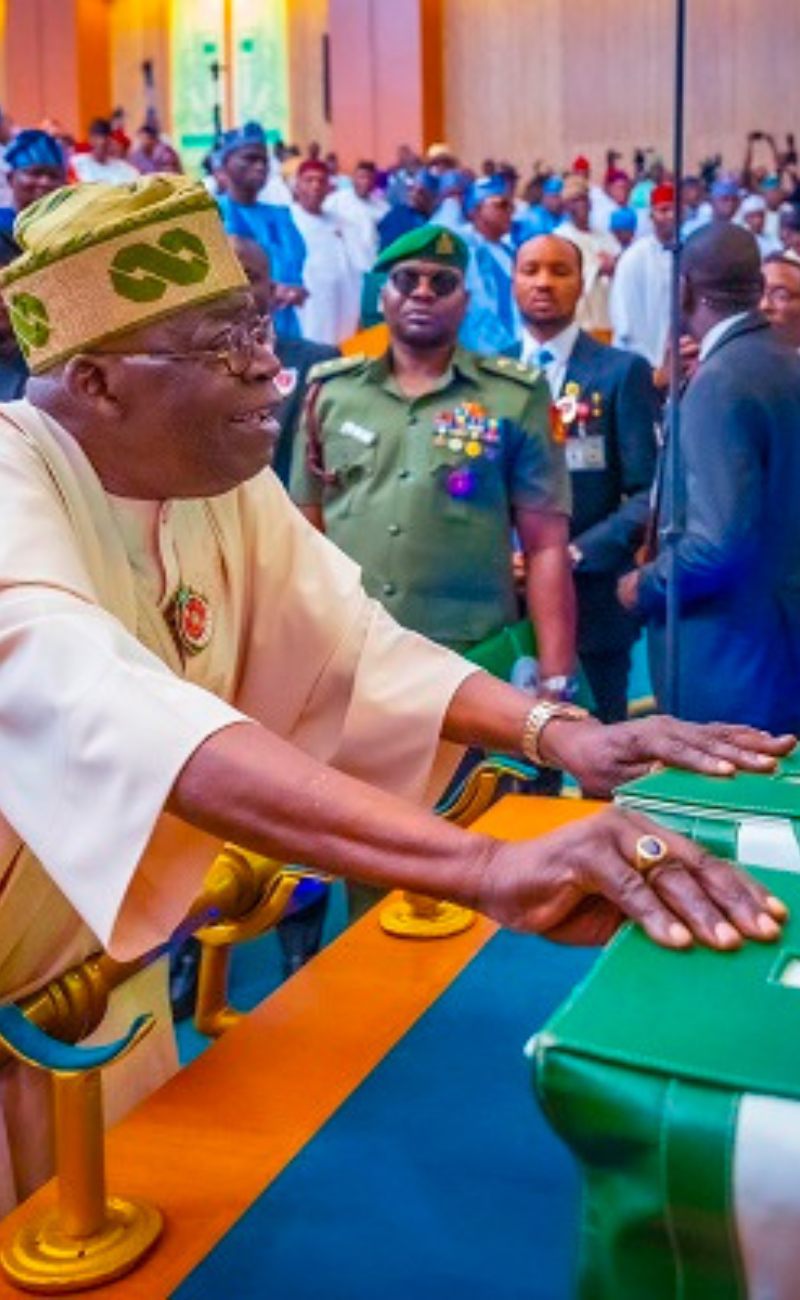Apart from recycling of old bills, the rush to sponsor bills by members of the 10th national assembly is not matched by a resolve to see the proposals through the legislative journey as OrderPaper report card reveals
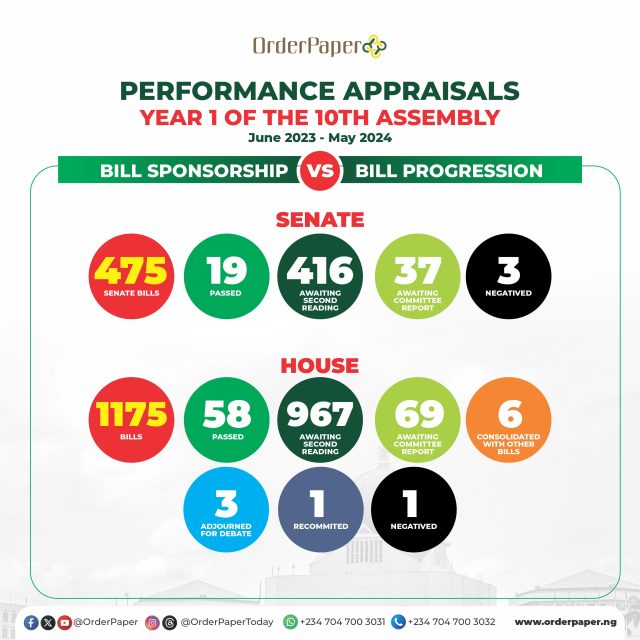
The first year of the 10th National Assembly has witnessed a surge but slow pace of progression of sponsored bills, a significant number of which were proposals recycled from the preceding 9th assembly.
These were highlights of the signature performance report card of the national assembly set for release this week by OrderPaper, Nigeria’s foremost parliamentary monitoring organisation and public policy think-tank.
The performance report card, distilled through detailed, objective and data-driven analysis of bills processed in the first year of the 10th National Assembly, reveals a significant gap between sponsorship and progression of legislative drafts.
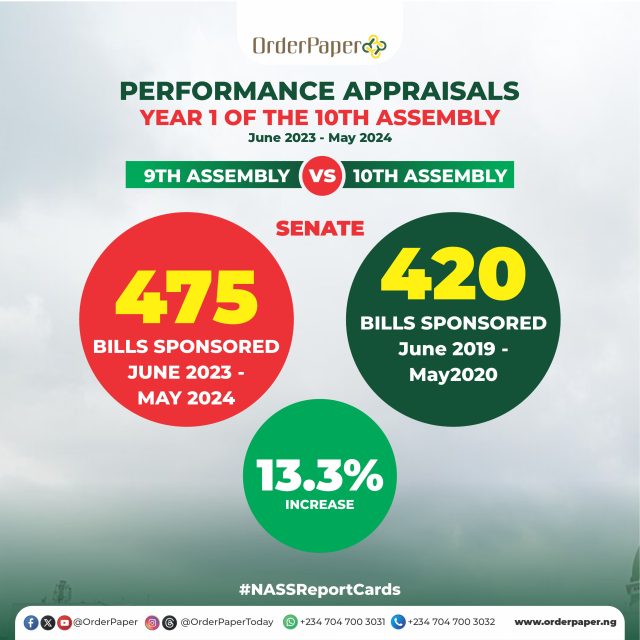
The data further revealed that over half of the bills sponsored in the Senate between June 2023 and May 2024, were recycled from previous assemblies, especially the immediate past 9th assembly. In a similar discovery, nearly one-third of the bills processed in the House of Representatives within the same period were resurrected from the past. This trend raises grave concerns about possible legislative ‘copy-pasting’ and further swirls speculations of merchandising of bills in the federal legislature. The analysis by OrderPaper shows that from June 2023 to May 2024, the Senate introduced a staggering 475 bills out of which only 19 have been passed while 416 remain stuck awaiting second reading.
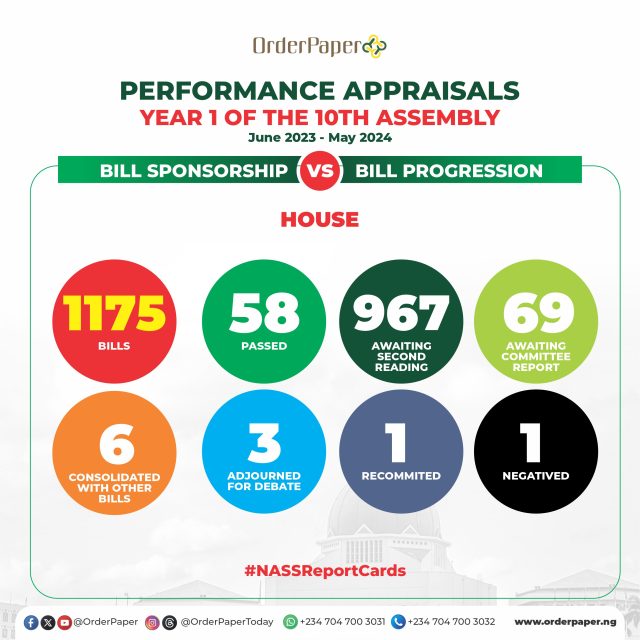
In like manner, out of 1,175 bills introduced in the House of Representatives in the same period under review, only 58 have been passed while a vast majority of 967 are awaiting second reading.
Among several other datasets produced by the inimitable OrderPaper analysis, 15 senators did not sponsor a bill while 149 members of the house, which is 12.6 percent of the total membership, did not sponsor any bills in the period under review. Notably, 62 percent of these representatives in the green chamber with no bills to their names, are first-time lawmakers.
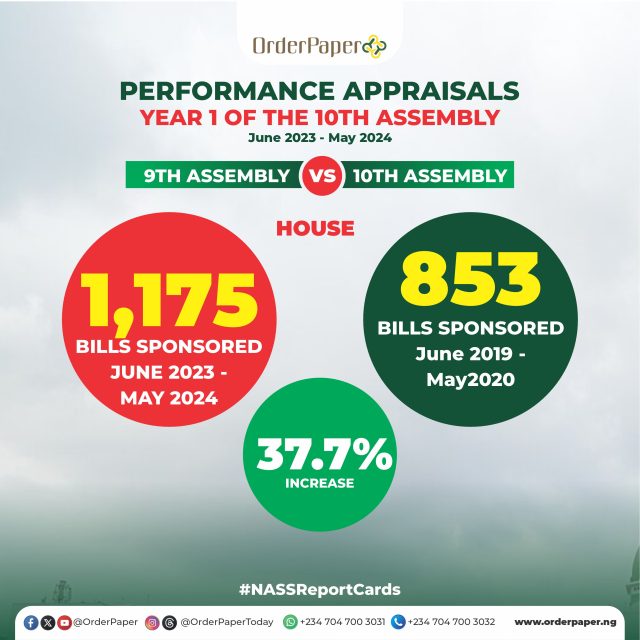
The performance report also highlights a troubling lack of focus on critical issues of national importance. Bills related to agriculture and food security make up only 5.8 percent of the total House bills and 7.3 percent of Senate bills.
Security-related bills account for 7.2 percent of House bills and 5.4 percent of Senate bills. Despite the significant challenges faced by citizens in these sectors in recent years, bills addressing these issues remain few, with many not even progressing past the first reading.
Distinct datasets of the performance report cards will be released on the official website of OrderPaper – https://orderpaper.ng/. Constituents of the 469 members of the national assembly, political and business leaders, civil society organisations as well as the general public are invited to keep tab on the website and social media pages of OrderPaper.
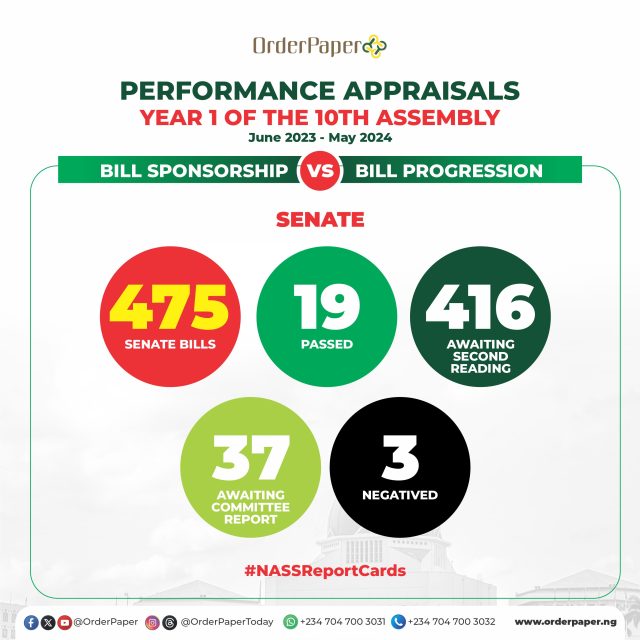
Commenting on these key findings of the highly anticipated and unimpeachable performance report card of the first year of the 10th National Assembly, Oke Epia, Founder and Executive Director of OrderPaper, said the surge in bill submissions by lawmakers and slow progress in processing underscores a real challenge the national assembly has been grappling with over the years: getting bills through to the legislative finish line.
Epia stated that while OrderPaper notes that its annual performance reports of the national assembly over the years have led to an increase in the number of bills sponsored by lawmakers, citizens have a responsibility to look beyond volume and focus more on progression, value and impact.
“Citizens must demand accountability from lawmakers by focusing not just on quantity, but on the quality and impact of their work with respect to bills processing in parliament,” he said, adding that: “OrderPaper Nigeria calls for urgent action from legislators, citizens, as well as partners of the parliament to deploy these performance report cards to push for impactful legislative governance. We must move from the hollow boast of sheer volume which willy-nilly results in stalled bills towards impactful laws that address Nigeria’s pressing challenges. The gap between promise and progress must be closed if the 10th assembly is to fulfil its potential.”
Giving insight into the approach and focus of this year’s performance report card, Joy Erurane, programme executive (creativity and innovation) at OrderPaper Nigeria, said the team undertook in-depth sectoral analysis of bills processed to cover key areas like education, health, economic development, security, and public finance. “This approach enables stakeholders in these sectors to navigate legislative impacts better and aid decision-making,” she said, adding:
“The data, which were sourced from the records of the national assembly and put through several integrity tests, highlights the imbalance in sectoral coverage of bills and the troubling trend of bill sponsorship without follow-through. While resurrecting bills from previous assemblies is not inherently bad, it points to a need for genuine legislative commitment to avoid what has been termed as legislative plagiarism in the literature. It also raises questions about the accuracy of legislative representation and the involvement of citizens in critical decision-making.”
About OrderPaper
OrderPaper is Nigeria’s foremost independent parliamentary monitoring organisation and policy think tank that bridges the gap between people and parliament. Our vision is to be the most authoritative organisation of choice and reference for parliamentary reporting, advocacy and public policy advisory in Africa. We are committed to providing simple and authoritative parliamentary data that empowers citizens and informs decision making.
For over five years, OrderPaper has consistently delivered credible annual performance appraisals of members of the National Assembly. Our #NASSReportCards are recognised for their unmatched accuracy, attention to detail, and in-depth analysis. This has earned our work uncontested credibility, as validated by the accolades received from members of the national assembly, civil society actors, and other stakeholders.

